Overview
This article examines the advantages and disadvantages of using mulch versus rock in luxury landscaping, emphasizing how each material fulfills distinct aesthetic and functional roles.
- Mulch, for instance, enhances soil health and moisture retention, contributing to a vibrant and thriving garden.
- In contrast, rocks provide durability and require minimal maintenance, making them an appealing choice for homeowners seeking longevity in their outdoor spaces.
Ultimately, the decision between mulch and rock hinges on individual landscaping goals and personal preferences, inviting homeowners to reflect on what best suits their vision for their outdoor environment.
Introduction
The choice between mulch and rock in luxury landscaping transcends mere aesthetics; it embodies essential considerations of functionality, maintenance, and environmental impact.
- Mulch, with its organic roots, enriches soil health and supports vibrant plant life, offering homeowners the advantage of nurturing their gardens.
- In contrast, rock presents a sleek, modern appearance that requires minimal upkeep, appealing to those who prioritize durability.
As homeowners deliberate their options, they confront a pivotal question: should they emphasize the nurturing qualities of organic materials or the lasting resilience of stone?
By exploring the strengths and weaknesses of each, homeowners can illuminate the path to creating stunning outdoor spaces that not only reflect their personal style but also enhance their property value.
Understanding Mulch and Rock in Landscaping
Mulch, typically composed of organic materials such as wood chips, bark, or straw, is applied to the ground surface to retain moisture, suppress weeds, and improve soil health. As it decomposes, this organic matter enriches the soil with essential nutrients, making it particularly advantageous for plants that thrive in consistently moist conditions. Regular maintenance, including replenishing ground cover and weeding, is crucial when using organic materials, which should be replaced or topped off every one to four years.
In contrast, stone landscaping employs non-organic materials like gravel, river stones, or decorative boulders. These elements do not decompose, offering a modern aesthetic while serving practical functions such as drainage and erosion control. Additionally, rocks are nonflammable, providing defensible space in areas prone to wildfires, and they help suppress weeds by blocking sunlight and forming a barrier against weed growth.
In the debate of mulch vs rock, both organic materials and stone can significantly enhance the visual appeal and functionality of luxury landscapes, yet they cater to different needs. For instance, organic materials are ideal for regions that require consistent moisture retention and soil enhancement, while stones offer a low-maintenance solution that withstands severe weather and reduces the need for frequent replacement. It is suggested that mulch be renewed every one to four years, depending on the type, whereas stones can last indefinitely with minimal upkeep, leading to lower long-term costs due to their durability.
Landscape architects often advocate for the use of stones in upscale projects, emphasizing their longevity and ability to create a unique, contemporary look. For example, strategically placed stones can prevent ground erosion on slopes, making them a practical choice for luxury gardens. Conversely, ground cover is favored for its effectiveness in improving soil composition and fostering plant health, especially in lush, vibrant settings. Furthermore, stones can absorb and retain heat, which may stress plants in warmer climates—an important consideration for homeowners.
Ultimately, the choice of mulch vs rock depends on specific landscaping goals, aesthetic preferences, and maintenance capabilities. By combining both materials, homeowners can achieve a versatile and tailored approach, reaping the benefits of each while crafting stunning outdoor spaces. At Grow Landscapes, our expert landscaping maintenance services—including mowing, leaf removal, weeding, compost top dressing, and slow-release fertilizing—ensure that your outdoor environments flourish, delivering the comprehensive care necessary to uphold the luxurious appeal of your landscape.
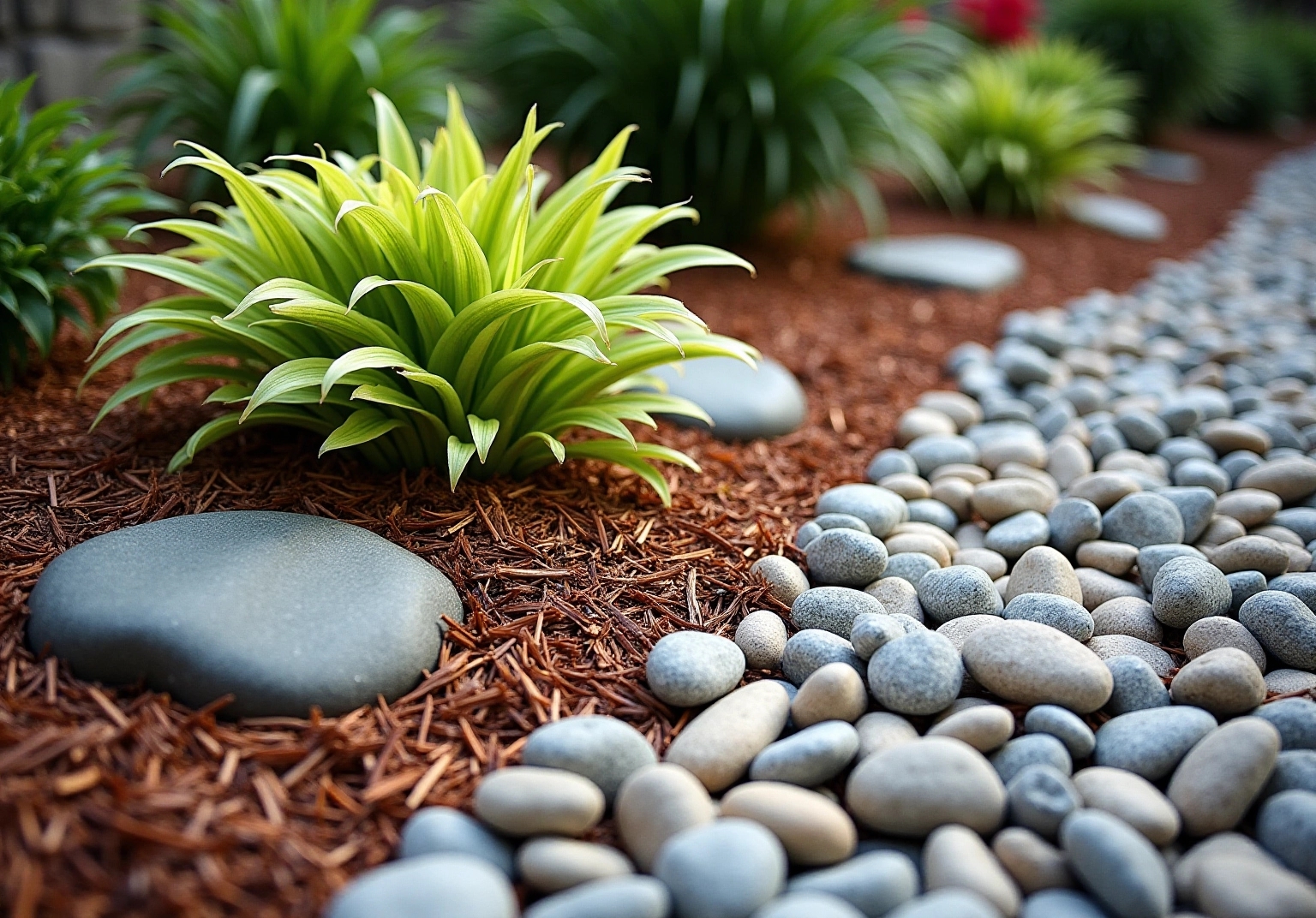
Advantages of Using Mulch for Luxury Landscapes
When considering mulch vs rock, mulch presents several advantages in luxury landscaping, especially when combined with the expert services of Grow Landscapes.
- It retains moisture in the ground, which decreases the necessity for frequent watering—an essential benefit in arid climates.
- Organic matter inhibits weed growth, reducing competition for nutrients and water among plants. This ensures that your landscape remains lush and vibrant.
- Furthermore, as organic matter decomposes, it enriches the soil, promoting more vigorous plant growth—an integral part of our holistic care strategy.
- The aesthetic appeal of organic material can also elevate the overall design, providing a natural, cohesive look that complements luxurious features like patios and pools.
- Additionally, in the discussion of mulch vs rock, organic mulch enhances soil structure and health, making it a favored choice among many luxury landscape designers, including our skilled team at Grow Landscapes, who are committed to transforming outdoor spaces into luxurious retreats.
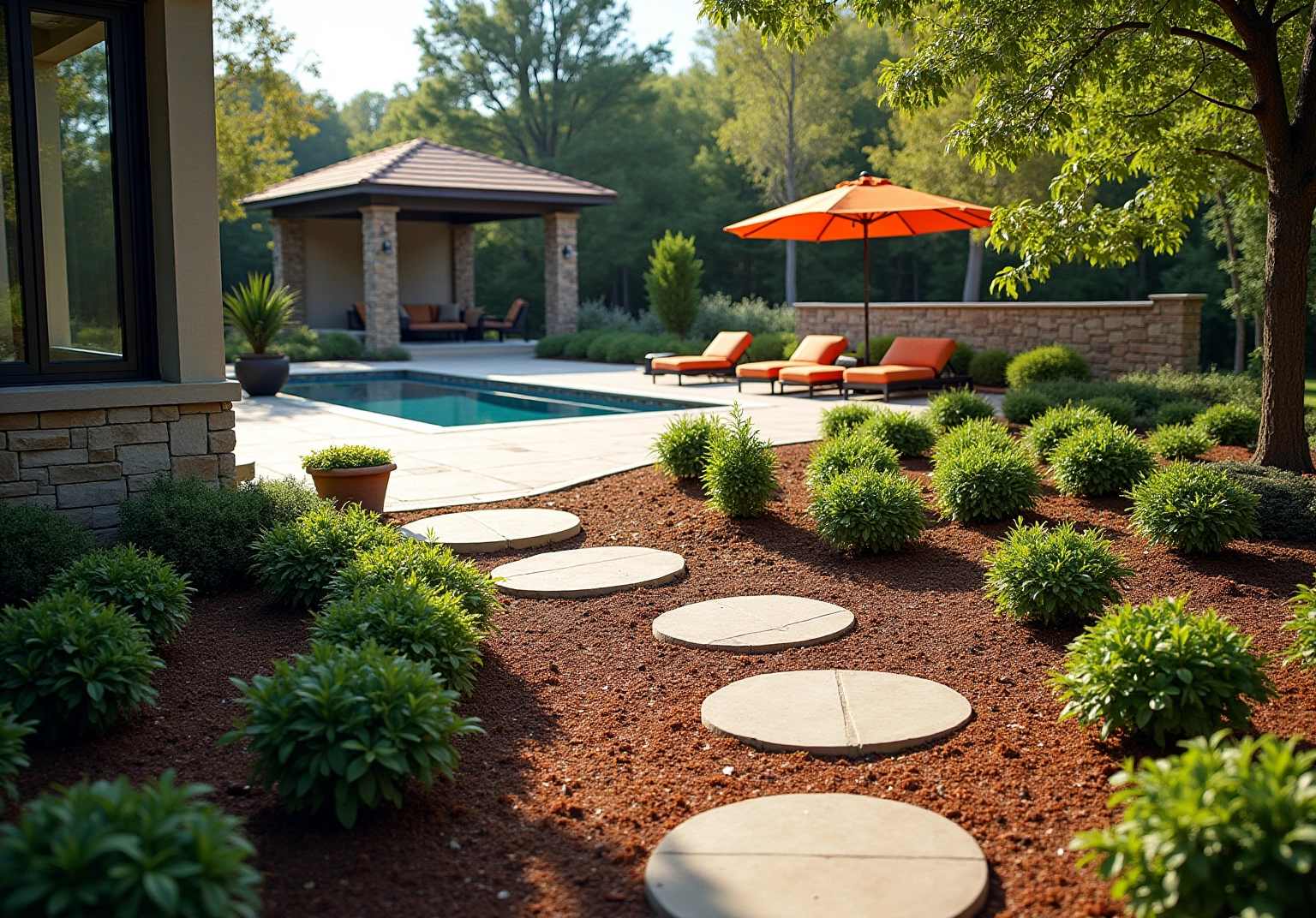
Benefits of Rock in High-End Landscaping
Rocks present a multitude of advantages in luxury landscaping, especially for homeowners seeking low-maintenance solutions. Their durability minimizes the need for frequent replacement, significantly reducing upkeep efforts. With exceptional drainage characteristics, stones are particularly suitable for areas prone to water accumulation, effectively preventing issues related to excessive moisture. Aesthetically, they offer a modern, clean appearance that complements contemporary architectural styles, thereby enhancing the overall visual appeal of outdoor spaces.
Moreover, stones can effectively delineate areas such as pathways and garden borders, adding structure and organization to the landscape. The inherent durability of stones ensures they retain their appearance and functionality for years, making them a cost-effective option over time. Statistics indicate that stone landscaping can lead to long-term savings in maintenance and water conservation, further enhancing its appeal as a sustainable choice for discerning homeowners. Despite higher initial costs, industry insights reveal that stone landscaping provides enduring savings in upkeep and water efficiency.
Furthermore, landscape experts emphasize the importance of harmonizing aesthetics with functionality when selecting stones for landscaping, ensuring that the chosen materials elevate the overall design vision. Case studies, such as those exploring the integration of stones and organic materials in garden design, illustrate practical applications of stones in creating low-maintenance, visually striking outdoor areas. Specific types of stones, including granite, limestone, and sandstone from suppliers like Southwest Stone Supply, provide homeowners with a variety of options to enhance their landscaping projects.
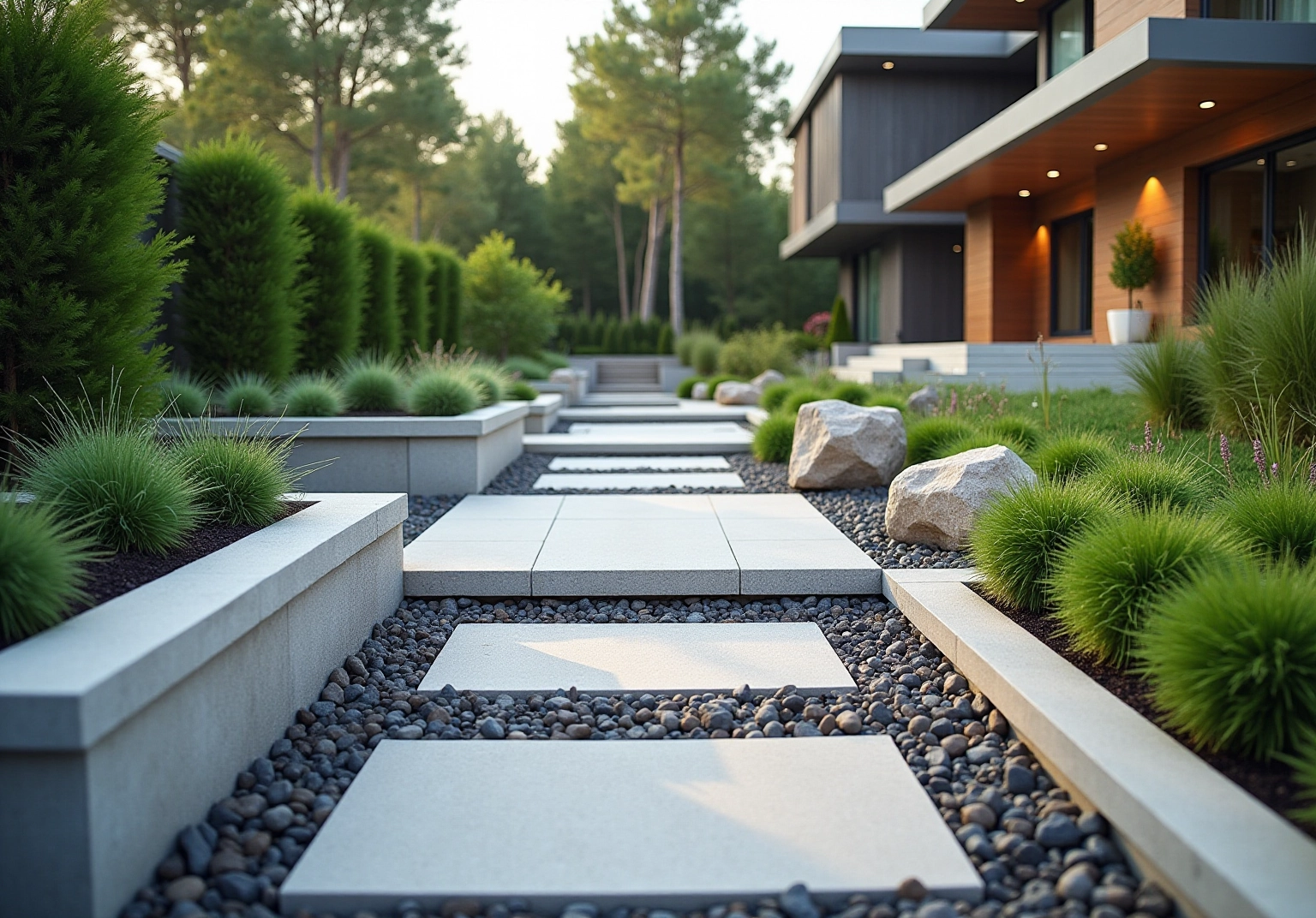
Disadvantages of Mulch and Rock: A Comparative Analysis
When considering mulch vs rock, both organic material and rock offer distinct features that can enhance outdoor spaces, yet they come with notable drawbacks.
When considering mulch vs rock, it’s important to note that:
- Mulch improves soil health and visual appeal but requires regular replenishment due to its organic nature.
- This necessity can lead to increased maintenance costs and labor over time.
- Additionally, statistics indicate that organic material may attract pests, such as slugs and earwigs, complicating maintenance and threatening vegetation health.
- If not managed properly, organic material can also harbor diseases, necessitating careful selection and monitoring.
- Despite these concerns, mulch can nearly double the growth rate of trees and vegetation, significantly improving rainwater infiltration and groundwater storage, which underscores its effectiveness for homeowners looking to enhance their landscapes.
Conversely, in the debate of mulch vs rock, stones provide a resilient option that demands minimal upkeep. However, they can retain heat, potentially stressing vegetation during high temperatures.
In the debate of mulch vs rock, it is important to note that:
- Unlike organic materials, stones do not contribute nutrients to the soil, which can hinder vegetation growth and overall health.
- Furthermore, the permanence of stones can pose challenges for adaptability in landscaping design as needs evolve.
- This inflexibility can be particularly problematic in luxury landscaping, where adaptability to changing aesthetics and functionality is often desired.
- Case studies reveal that while mulch vs rock may initially seem economical due to their durability, their long-term effects on vegetation health and landscape adaptability warrant careful evaluation.
- Additionally, it is important to consider that ground cover can present fire hazards in arid regions, adding another layer of risk for homeowners prioritizing safety in their landscaping choices.
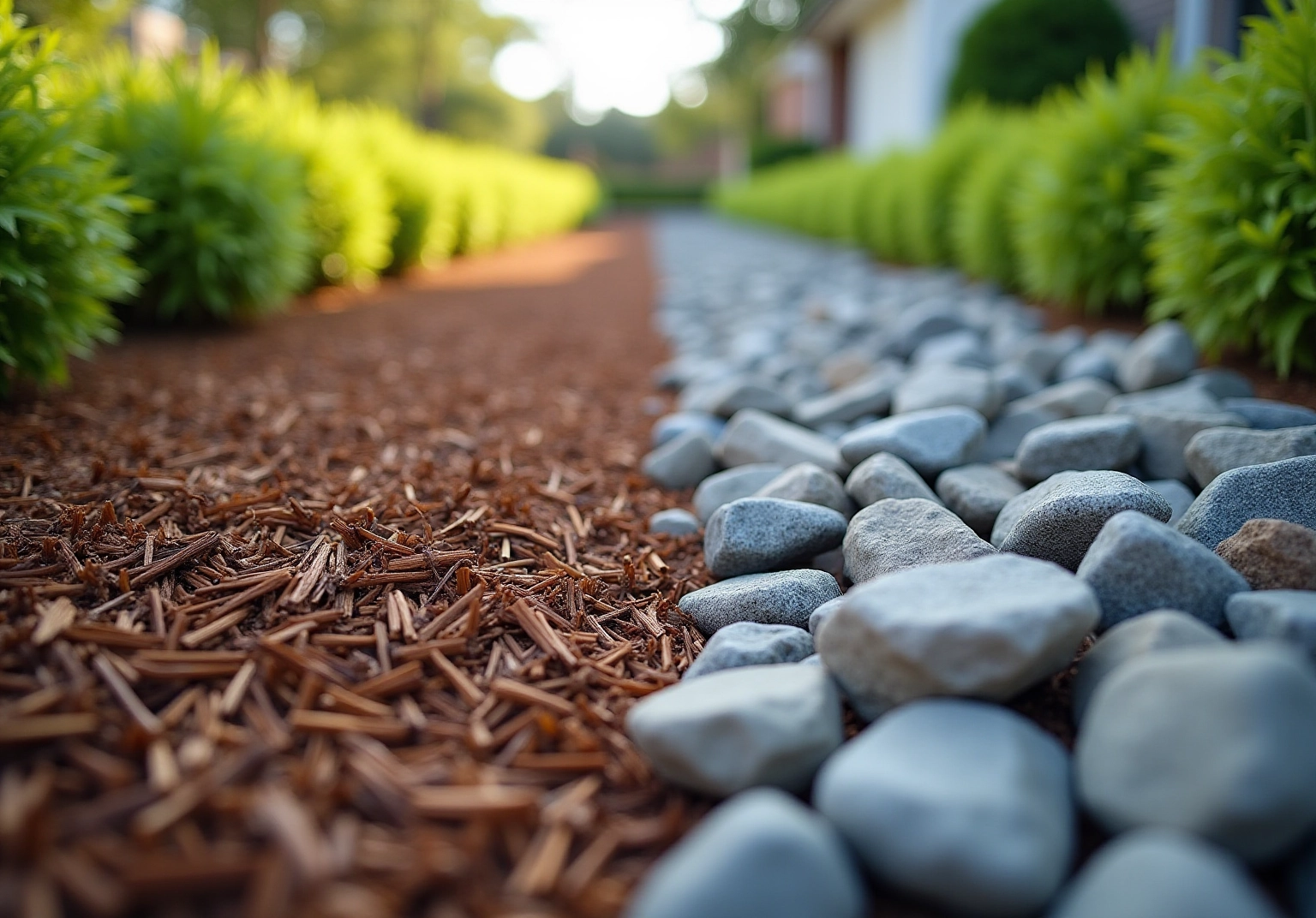
Choosing Between Mulch and Rock: Key Considerations for Luxury Landscaping
Selecting the right ground cover for luxury landscaping involves careful consideration of several key factors. Begin by assessing the distinct requirements of your plants. If moisture retention is crucial, organic covering is frequently the best option, as it can decrease water consumption by 20-25% and enhance soil health through nutrient cycling. Moreover, organic material is an economical choice for covering extensive garden spaces compared to stones. Aesthetics also play a significant role in the debate of mulch vs rock; stones impart a sleek, modern appearance, while mulch provides a softer, more inviting look that complements meticulously designed flower beds filled with vibrant blooms such as roses, hydrangeas, and lilies.
Maintenance requirements are another critical aspect to consider. For individuals who favor a low-maintenance environment, the comparison of mulch vs rock shows that stones are beneficial due to their longevity and resistance to deterioration, making them ideal for extreme weather. However, it’s essential to recognize that stones can retain heat, potentially putting pressure on nearby vegetation during hot summers, necessitating careful selection of species. Additionally, stones do not add nutrients to the ground, which may require extra fertilization for plants.
Furthermore, consider the climate and drainage conditions of your landscape. When considering mulch vs rock, mulch excels in preventing soil erosion, particularly in sloped areas, while rocks can enhance drainage but may require periodic adjustments as they can sink into the soil over time. It’s also crucial to be aware that excessive mulch can lead to moisture retention issues and attract pests. Ultimately, your choice should reflect your personal style, the functional needs of your outdoor space, and a long-term vision that harmonizes with the overall aesthetic of your property.
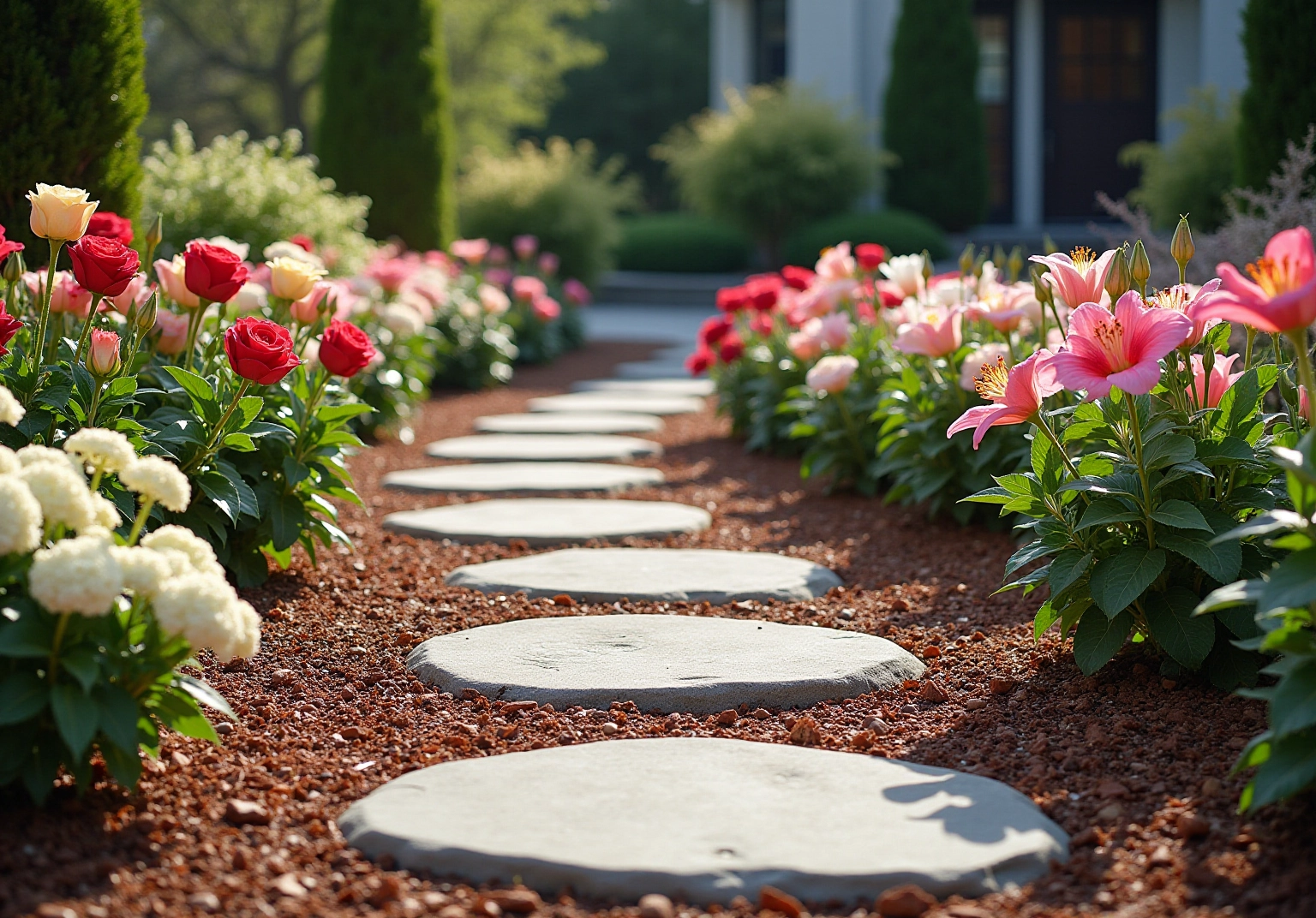
Conclusion
The decision between mulch and rock in luxury landscaping is pivotal for crafting visually stunning and functional outdoor spaces. Both options offer unique benefits, and understanding their distinct characteristics is essential for achieving the desired aesthetic and practical outcomes. Mulch enhances soil health and moisture retention, making it ideal for vibrant gardens, while rock provides a low-maintenance, durable solution that complements modern designs.
Key insights reveal that:
- Mulch fosters plant growth through nutrient enrichment and moisture conservation
- Rock excels in durability, drainage, and aesthetic appeal
Each material has its drawbacks:
- Mulch requires regular maintenance and can attract pests
- Rock may lead to heat stress for certain plants and lacks soil-nourishing properties
The choice ultimately hinges on specific landscaping goals, personal preferences, and maintenance capabilities.
Reflecting on these considerations, homeowners are encouraged to thoughtfully evaluate their landscape needs and aesthetic aspirations. By balancing the benefits of both mulch and rock, it is possible to create a luxurious outdoor environment that captivates the eye and promotes healthy plant life. Embracing a tailored approach can lead to sustainable, beautiful landscapes that stand the test of time, ensuring that the chosen materials harmonize with the overall vision for the property.
Frequently Asked Questions
What is mulch and what are its benefits in landscaping?
Mulch is typically composed of organic materials such as wood chips, bark, or straw. It is applied to the ground surface to retain moisture, suppress weeds, and improve soil health. As it decomposes, it enriches the soil with essential nutrients, benefiting plants that thrive in moist conditions.
How often should mulch be replenished?
Organic mulch should be replaced or topped off every one to four years, depending on the type of material used.
What materials are used in stone landscaping?
Stone landscaping employs non-organic materials like gravel, river stones, or decorative boulders.
What are the advantages of using stones in landscaping?
Stones do not decompose, offering a modern aesthetic and practical functions such as drainage and erosion control. They are nonflammable, help suppress weeds, and can last indefinitely with minimal upkeep, resulting in lower long-term costs.
How do mulch and rock compare in terms of maintenance?
Mulch requires regular maintenance, including replenishing and weeding, while stones require minimal upkeep and can last indefinitely.
What are the specific landscaping needs that mulch and rock cater to?
Organic mulch is ideal for regions needing consistent moisture retention and soil enhancement, whereas stones provide a low-maintenance solution that withstands severe weather.
How can combining mulch and rock benefit landscaping?
By combining both materials, homeowners can achieve a versatile approach, reaping the benefits of each while creating stunning outdoor spaces tailored to their specific goals and preferences.
What additional services does Grow Landscapes offer to enhance luxury landscapes?
Grow Landscapes offers landscaping maintenance services, including mowing, leaf removal, weeding, compost top dressing, and slow-release fertilizing, to ensure outdoor environments flourish and maintain their luxurious appeal.



